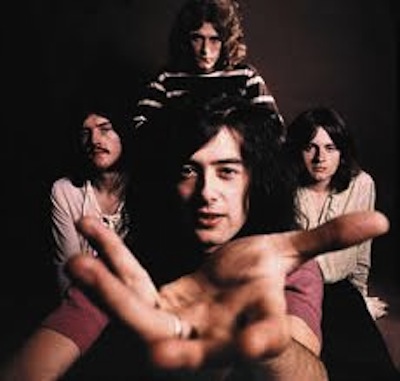A trial is needed to determine if Led Zeppelin’s Stairway to Heaven copies its opening notes from a song performed by the rock band Spirit, a federal judge has ruled.
US District Judge R. Gary Klausner ruled Friday that lawyers for the trustee of late Spirit guitarist Randy Wolfe had shown enough evidence to support a case that Stairway to Heaven copies music from the Spirit song Taurus, reports the New York Post.
Taurus was written by Wolfe in either 1966 or 1967, years before Led Zeppelin released Stairway to Heaven in 1971. Klausner wrote that while the songs have some differences, lawyers for Wolfe’s trustee may be able to prove they are substantially similar.
Led Zeppelin and Spirit performed at some concerts and festivals around the same time, but not on the same stage. Klausner wrote that the evidence presented so far represented a circumstantial case that Led Zeppelin may have heard Taurus performed before Stairway to Heaven was created.
After-hours phone and email messages sent to Helene M. Freeman, Led Zeppelin’s attorney, were not immediately returned. Experts hired by the band contend both Stairway to Heaven and Taurus use notes that have been used in music for centuries.
Francis Alexander Malofiy, attorney for Wolfe’s trustee Michael Skidmore, praised the ruling. He said while many copyright cases are an uphill battle, Klausner’s ruling brings his client one step closer to getting Wolfe credit for helping create one of the most recognizable song introductions in rock history.
Skidmore was able to overcome statute-of-limitations hurdles to sue over Stairway to Heaven because the song was remastered and re-released in 2014.
A jury trial is scheduled for May 10th in Los Angeles. Klausner’s ruling removed Zeppelin band member John Paul Jones from the case. Bandmates Robert Plant and Jimmy Page remain defendants in the case.
A trial would represent the third time in recent months that a Los Angeles federal jury has heard a copyright-infringement case involving a hit song. In March 2015, a jury found that Robin Thicke and Pharrell Williams had copied a Marvin Gaye song to create their 2013 hit Blurred Lines and awarded Gaye’s children $7.4 million. A judge trimmed the award, and the verdict is under appeal.
Later in the year, another jury was empaneled to determine whether the Jay Z hit Big Pimpin’ copied the work of an Egyptian composer, but a judge ruled in the rapper’s favor before deliberations began.
Listen to a comparison of both songs below.
source: nypost.com


7 Responses
Hundreds, thousands of songs are very similar, doesn’t always mean it’s intentional. Even if it was in this case, rappers get away with “sampling” all the time! But even as creative as Led Zeppelin were, if this was intentional, then they should give credit where it’s due.
Here are ten more examples.
https://www.youtube.com/watch?v=tiiY4ciKFQA
Hmm, I must say, that’s pretty incriminating. I heard some of those samples before, but not all of them. I’ve been a Zeppelin fan my whole life, and always will be no matter what, but after hearing all that, I’ve lost a little respect for them, just a little.
Who’s going to sue Dee Snider for his complete rip of “Come All Ye Faithful”? Seriously, this sets a bad precedent, it doesn’t meet the standard for plagiarism.
Come on Doug! give Page credit, he knows which parts to steal and use, that’s called being an artist.
Yes and no Shannon, when you’re completely creative you don’t have to steal anything! Of course Page had a lot of creativity, but I also think that when he got writers block and got frustrated, he looked (sometimes) for the easy way out. Also, if you’re going to borrow some “parts,” you should at least give the credit due to whoever it was that you “borrowed” them from, and the rightful recognition.
Yes and yes Doug…everyone borrows, steals, etc…you don’t think those Blues guys stole from each other? In the Classical era, the composers would use other composers’ music all the time, for a section THEY were writing.
I’m not a huge Led Zeppelin fan, so I’m not being swayed by any wild devotion to them. What I hear is not plagiarism, it’s two different songs that happen to use the same chord in one of their parts picked in a similar way. After that, they diverge into distinct and separate paths. There are 12 notes in Western music folks, it’s all how you throw them together that makes music unique. If you’ve ever studied any music theory, you know that there are even “correct” chord progressions to use in a key, which also dictate (or at least suggest) which should be major, minor, diminished, etc. It’s why we sometimes hear things and say “that sounds wrong”, or when a player makes a mistake and it sounds bad, because those “rules” are supposed to keep you playing things that sound harmonious together. One person can’t claim ownership of a chord, or a chord progression. There’s a hell of a lot more going on in Stairway to Heaven than that one arpeggiated chord progression. Maybe Randy Wolfe did inspire Jimmy Page to use that chord, but that doesn’t equal “stealing his song”.
If I read a book that starts with the sentence “The trees swayed in hurricane force winds”, and I published my own that started with “The Trees is one of my favorite Rush songs”, should the other author be able to sue me for starting my sentence with “The trees”? They’re two completely different statements that start with the same two words. That’s what I hear when comparing “Taurus” to “Stairway to Heaven”.